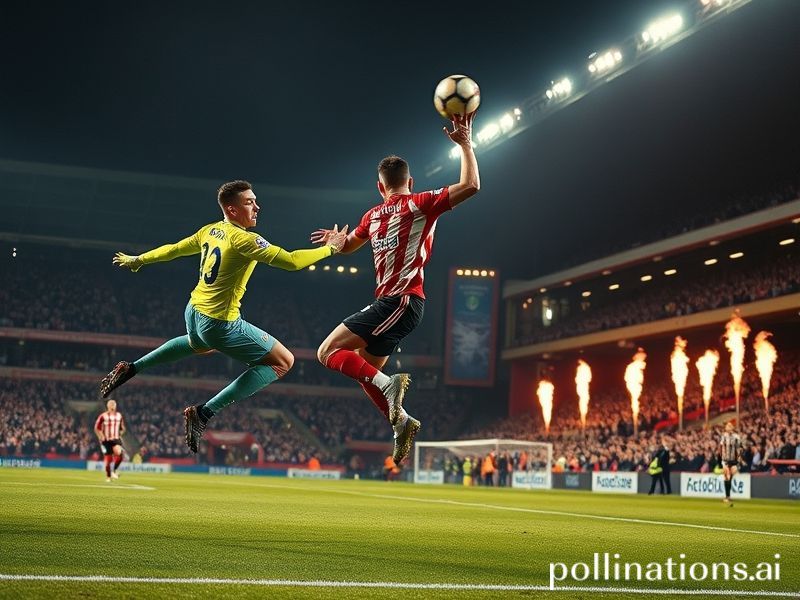Rust Belt Rumble: Sunderland vs Aston Villa as a Global Parable of Industrial Decline and Low-Budget Hope
Sunderland vs Aston Villa: When Two Former Empires Meet in the Colosseum of Relegation
Rome had the Colosseum; we have the Stadium of Light on a damp Tuesday night. Same blood sport, slightly better floodlights. Yet when Sunderland host Aston Villa, the global audience is treated to more than a relegation six-pointer—it’s a live autopsy performed on two Victorian industrial towns that once built the world and now struggle to build a coherent back four.
From a safe distance—say, a rooftop bar in Bangkok or a co-working space in Lagos—this fixture looks like an antique postcard of Britain’s rust belt: two proud clubs that once fed entire economies now reduced to auditioning for the EFL’s version of a Netflix documentary nobody asked for. Sunderland’s shipyards once launched vessels that carried half the planet’s tea; Aston Villa’s foundries forged the rails that bisected continents. Today they launch long balls and forge excuses, but the romance lingers like cheap lager on polyester.
International viewers tuning in via illicit streams and overpriced subscriptions will note the geopolitical microcosm on display. The starting XIs are less a football team than a Brexit customs form: Scottish grit, Irish flair, African pace, and the occasional Nordic loanee everyone pretends is the next Haaland until proven otherwise. It’s globalisation wearing last season’s kit, hoping the badge still fools the border guard. Meanwhile, Chinese betting syndicates shift decimal points faster than either club can shift season tickets, proving that capital moves more elegantly than a Championship winger with cramp.
The tactical subplot is equally instructive. Sunderland’s head coach—fresh from a PowerPoint presentation titled “High Press, Low Budget”—fields a formation optimistically labeled 4-3-3 but functionally closer to 1-9-1: one heroic centre-back, nine confused midfielders, and a lone striker wondering why his GPS thinks the nearest teammate is somewhere near Middlesbrough. Aston Villa, coached by a man who still quotes Paulo Freire as if liberation theology applies to zonal marking, responds with a possession stat that looks impressive until you realise 78% of it occurs in their own third, like a teenager practicing mindfulness in a burning house.
For the neutral economist, the match is a seminar in post-industrial schadenfreude. Deloitte’s annual football-money list places both clubs just below Everton and just above a midsize Kazakh copper mine, which is fitting: both have been strip-mined by owners whose business plans appear to have been drafted on a napkin during happy hour. The stadiums still sell out because hope, unlike steel, can be recycled indefinitely. Sponsorship hoardings advertise crypto exchanges nobody understands and erectile-dysfunction pills nobody admits to needing—late capitalism in 90-minute form, complete with added injury time for existential dread.
And yet, the broadcast cuts to a child in a Sunderland shirt half a world away—São Paulo, perhaps, or Seoul—learning English swearwords in real time. That kid doesn’t care that the club’s wage bill is smaller than the yearly coffee budget of PSG’s analytics department. He cares that, for two hours, adults scream at a ball with the same fervor his parents reserve for tax audits. The universality of despair, televised live and in HD.
As the whistle nears, both sets of fans join in a chorus that translates, roughly, to “We are staying up.” The statement is statistically unlikely, grammatically optimistic, and spiritually necessary—proof that humans will sing even while the Titanic’s string quartet rearranges deck chairs. The final score? Immaterial. The real result is broadcast in boardrooms from Dubai to Delaware: legacy brands bleeding soft power, gambling on one last throw of the dice before the auctioneer’s hammer falls.
Somewhere, a historian updates a footnote: “See Sunderland vs Aston Villa, 2024—when the empire finally ran out of empire.” And still the chant echoes, because surrender is un-British and irony, unlike defense, remains optional.







